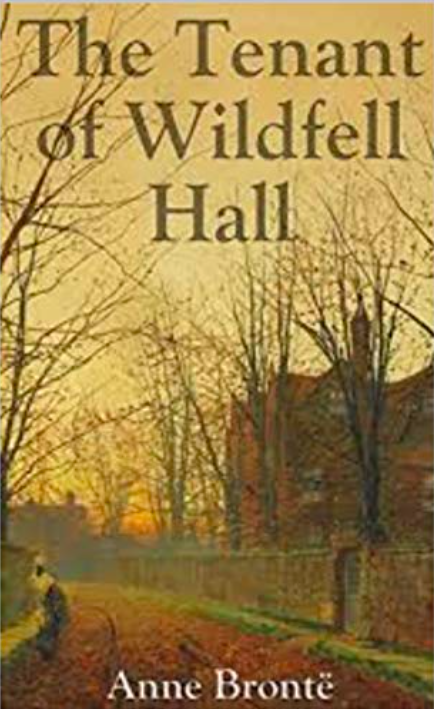
I did not enjoy Anne Brönte’s Tenant of Windfell Hall.
I read it as our book club pick this month – and only finished with great difficulty so that I was qualified to discuss it. I am sorry and realise that amongst my learned literary colleagues this may cast some aspersions on my taste, but I simply found the text so florid and turgid that I struggled through it. Oh, I can appreciate it for being brazenly feminist and a standout set of ideas and beliefs expressed in the time that it was written and by whom it was written. However, it so convoluted and full of bombacious verbology (sorry had to) as to be distracting and annoying to a modern reader. Sorry.
I see the story there but cannot fathom the necessity of burying that story in layers and layers of excessive prose. The prose doesn’t heighten appreciation of or develop any sense of empathy in any character. I do not feel that it is reflective of actual everyday life amongst any class at any time. It sounds and feels madey–uppey to me. I realise that it is meant to be allegorical and I see that to be the intention. But the other side of this has to be didactic intention (and I sense that this was the author’s intention – or the whole thing is pointless because it surely doesn’t stand on being beautiful craft) and so do this it has to speak to an audience that it seeks to reach. I’d read this if no other books were sitting on the shelf.
Even the story is not an engaging one for me. It may well be for others. The first section feels like it is written from a female’s perspective of what a man may see and say, and I don’t think it succeeds in that – look to Robert Galbraith. The voice is far more authentic when the author adopts the perspective and voice of the female protagonist, but for me, an only marginal improvement in the turgidity.
There are lovely literary-historical significances to this writing. But it is a long and flowery novel that appeals not to me. The context and nature of the author, her sisters and the family in general is what provides it with a measure of notability. That it was written and published under a masculine pseudonym because it had to be is of historical note, but in that, I cannot give it benefit to being a good read or novel – in the time that we find ourselves. There are lovely turns of phrase and brilliant combinations of words. Much of what would possibly appeal to a Joycean scholar. There’s actually even a decent story here, but I cannot fell that the narrative does it justice. The method of conveying the story takes away from the underlying themes and the story arc itself for me.
I was frustrated by it. I felt distant from human characters and didn’t find that the nature of the writing established any connection with them. It was challenging to juggle the roles and their own substories – to me, they get lost in the excessive language. The sentences are of dismaying length… ‘Might I not find more benefit in the contemplation of that venerable pile with the full moon in the cloudless heaven shining so calmly above it – with that warm yellow lustre peculiar to an August night – and the mistress of my soul within , than in returning to my home, where all comparatively light, and a life, and cheerfulness, and therefore inimical to me in my present frame of mind, – and the more so that its inmates all were more or less imbued with that detestable belief, the very thought of which made my blood boil in my veins – and how could I endure to hear it openly declared, or cautiously insinuated – which was worse? ‘*This a random sentence chosen from a random page*. It’s half a Kindle page and by the time I am halfway through I have forgotten what she started talking about…and that is a single sentence…not a paragraph, not a chapter, not the novel itself. Sorry, but being a simple man, with a simple mind, I cannot appreciate what must be the absolutely mesmerising prose to some. She loses me in her overly lavish and convoluted prose.
As I said, I appreciate that it addressed themes that were simply not discussed, and certainly not by a woman in the times in which it was written. Still, I have to believe that it gains much of its reputation from the external context than from the actual value implicit in the quality of writing. It’d be great fodder for a literature course to pull apart and unpack, disentangle and dissect for reading into the reading. I admittedly found it a test – and maybe I fail in it. Still, I do think that there is some responsibility incumbent upon an author to entice and entangle and involve and inspire and draw one into their writing. I simply don’t get that from The Tenant of Wildfell Hall. This is all subjective, so I leave it at that.
